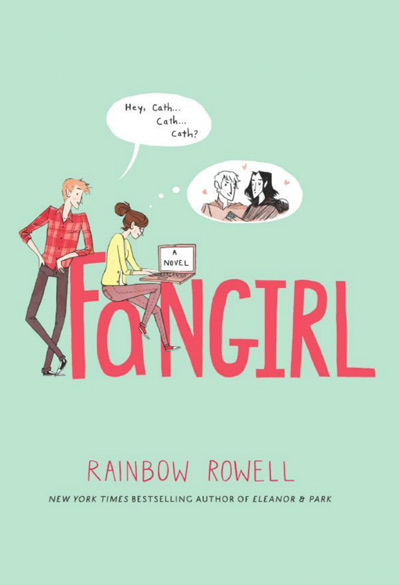6 Fictional Books We Wish We Could Read
 We’ve all had the experience of falling into a fictional world and finding ourselves unable to climb back out—and it seems that’s a problem for the writers who create those worlds, too. Today, Rainbow Rowell (she of Eleanor & Park, the best ’80s teen movie never to be transported through time and published as a novel) announced her next book, Carry On, about the adventures of a boy wizard named Simon Snow. It sounds like a total left turn from her romance wheelhouse, unless you read her 2013 book Fangirl, about Cath, a young writer obsessed with a fictional Harry Potter-esque character named…Simon Snow.
We’ve all had the experience of falling into a fictional world and finding ourselves unable to climb back out—and it seems that’s a problem for the writers who create those worlds, too. Today, Rainbow Rowell (she of Eleanor & Park, the best ’80s teen movie never to be transported through time and published as a novel) announced her next book, Carry On, about the adventures of a boy wizard named Simon Snow. It sounds like a total left turn from her romance wheelhouse, unless you read her 2013 book Fangirl, about Cath, a young writer obsessed with a fictional Harry Potter-esque character named…Simon Snow.
Fangirl included substantial excerpts from the imaginary Simon Snow novels, not to mention Cath’s rather racier fan fiction, including a love affair between Simon and Draco Malfoy stand-in (and vampire) Baz. Cath’s mega-popular work of fan fiction was called Carry On, which I’d say provides a pretty substantial hint as to what we can expect from Rowell’s new book.
Rowell isn’t the first author to turn a fictional book into reality. Catherynne M. Valente imagined a whimsical children’s tale within the pages of her twisty adult fantasy Palimpsest, and later turned it into an Andre Norton Award–winning standalone, The Girl Who Circumvented Fairyland in a Ship of Her Own Making. And J.K. Rowling has turned the practice into a cottage industry, pulling Fantastic Beasts and Where to Find Them, Quidditch Through the Ages, and The Tales of Beedle the Bard from the shelves of the Hogwarts library into our world.
I fully support this practice. There’s nothing worse than reading about a really fantastic book you’ll never get to experience, because it doesn’t exist. Here are 6 more fictional books I’m dying to read.
Hogwarts: A History, by Bathilda Bagshot (from the Harry Potter series, by J.K. Rowling)
Hermione quoted from this one so often, I feel like I’ve read it already, but I’d cast a few Unforgivable Curses for a chance to read the complete text of this history of Harry Potter’s alma mater. The story of the school’s founding (and the rivalry between Godric Gryffindor and Salazar Slytherin) could be a series unto itself.
The Amazing Amy books, by Rand and Marybeth-Elliot, Ph.d (from Gone Girl, by Gillian Flynn)
No spoilers, but anyone who has read Gone Girl will wonder how a character as…complicated as the missing Amy could ever inspire a series of whimsical children’s picture books. I’d love to read them and see the authors’ (married psychiatrists, and Amy’s parents!) twisted psychology at work.
Dying Earth, by Martin Silenus (from Hyperion, by Dan Simmons)
In Simmons’ epic Hyperion books, Earth is but a memory, destroyed by a scientific experiment gone terribly wrong. The poet Martin Silenus, one of the last people to leave the dying planet, wrote a tortured epic about its waning days, which went on to sell billions of copies. Billions! Must be a hell of a good poem.
The Grasshopper Lies Heavy, by Hawthrone Abendsen (from The Man in the High Castle, by Philip K. Dick)
In The Man in the High Castle, Philip K. Dick imagines a world in which the Allies lost World War II and the U.S. is controlled by Germany and Japan. Within this alternate history exists another book, a pulp novel called The Grasshopper Lies Heavy, about a different end to the war—one in which the Axis powers lost. Are you confused yet? Welcome to the mind of Philip K. Dick. I’d devour the complete Grasshopper, if only because, in Dick’s alternate U.S., reading it has been made a crime, and I’m a sucker for supporting banned books.
The Princess Bride, by S. Morgenstern (from The Princess Bride, by William Goldman)
Sure, we can read William Goldman’s abridged “good parts” version of S. Morgenstern’s story of heroes, sword fights, romance, and Rodents of Unusual Size, but I’d like a peek at the whole thing. It’s like when I listen to an audiobook and they cut out the footnotes. Maybe I want to read the boring parts!
The Shadow of the Wind, by Julián Carax (from The Shadow of the Wind, by Carlos Ruiz Zafón)
In Zafón’s fantastical, metafictional work, a young boy is tasked with protecting the title volume from nefarious forces trying to erase all of the fictional author’s work from the face of the earth. Throughout, we get hints of what secrets lie within its pages, but it would be fascinating to read it at a remove (though once you know the twist of Zafón’s book, it’s arguable that’s actually impossible).
What fictional book do you wish you could read?